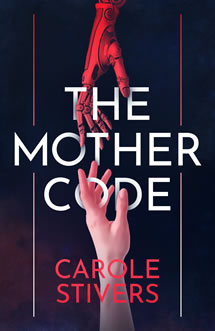Reviewed by Robert Goodman.
By Carole Stivers, Hachette, $32.99.
 Carole Stiver’s novel The Mother Code sits in a long literary tradition. The idea of robots, or artificial intelligences, growing and raising children has a long history in the science fiction. Some older examples include The Naked Sun by Isaac Asimov (1950s), Earthsearch (originally a BBC radio drama) by James Follett (1970s) and Voyage from Yesteryear by James P Hogan (1980s). More recently, the Australian-made Netflix film I Am Mother explored this territory and Ridley Scott has a similarly themed TV show on the way called Raised by Wolves. This harks back to an older literary tradition of children not raised by humans – from the myth of Romulus and Remus, reputedly actually raised by wolves through to stories like Tarzan or The Jungle Book. And in an age of children reared with devices powered by Siri or Cortana, it is possible that the reality is catching up to the fiction.
Carole Stiver’s novel The Mother Code sits in a long literary tradition. The idea of robots, or artificial intelligences, growing and raising children has a long history in the science fiction. Some older examples include The Naked Sun by Isaac Asimov (1950s), Earthsearch (originally a BBC radio drama) by James Follett (1970s) and Voyage from Yesteryear by James P Hogan (1980s). More recently, the Australian-made Netflix film I Am Mother explored this territory and Ridley Scott has a similarly themed TV show on the way called Raised by Wolves. This harks back to an older literary tradition of children not raised by humans – from the myth of Romulus and Remus, reputedly actually raised by wolves through to stories like Tarzan or The Jungle Book. And in an age of children reared with devices powered by Siri or Cortana, it is possible that the reality is catching up to the fiction.
When The Mother Code opens, a group of “mothers” is flying to safety with their precious cargo of embryos. While following one of these mothers, and her “son” Kai, the narrative also drops back in time to explore why the need for this drastic action. The reason for this is a slow-moving, man-made global pandemic using a new technology that alters the DNA of the victims (possibly requires a trigger warning for those having issues dealing with Covid). While scientists search for a cure, they also turn to a plan B – creating embryos that will be immune to the virus and sentient robots to raise them. Nothing goes quite according to plan, and as the two stories come together things only get more dire for the children, leading to some tough moral questions and plenty of action.
Stivers does not make the most of her premise in The Mother Code. Much of the story is told rather than shown, the characters only really coming to life in the second half of the book at which point they continue to make bad, rapid decisions that tend to make the situation worse. The children themselves are the type of precocious ten and eleven year olds that only tend to be found in novels or movies. And much of the plot is driven by a series of highly unlikely coincidences
One of the joys of science fiction is its capacity to create a sandbox in which to test real world issues. As with other books and stories that tackle these issues there is a lot of food for thought underlying the action. Stivers takes full advantage of her premise to dig deeply into questions of what it means to be a parent and to raise a child, and to explore the bonds between parents and children. But also more complex questions such as how important is it for a child to have a belief system, and how an artificial intelligence could be flexible enough to support children to explore their boundaries and become independent. These questions in particular, drive the action in the last third of the book, creating a fascinating tension out of the moral quandaries that the characters find themselves in.
This and 500 more reviews can be found at www.pilebythebed.com.











